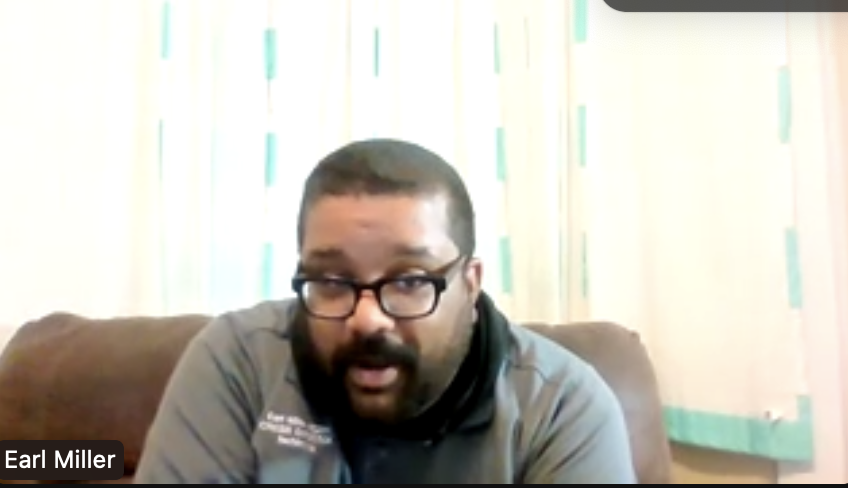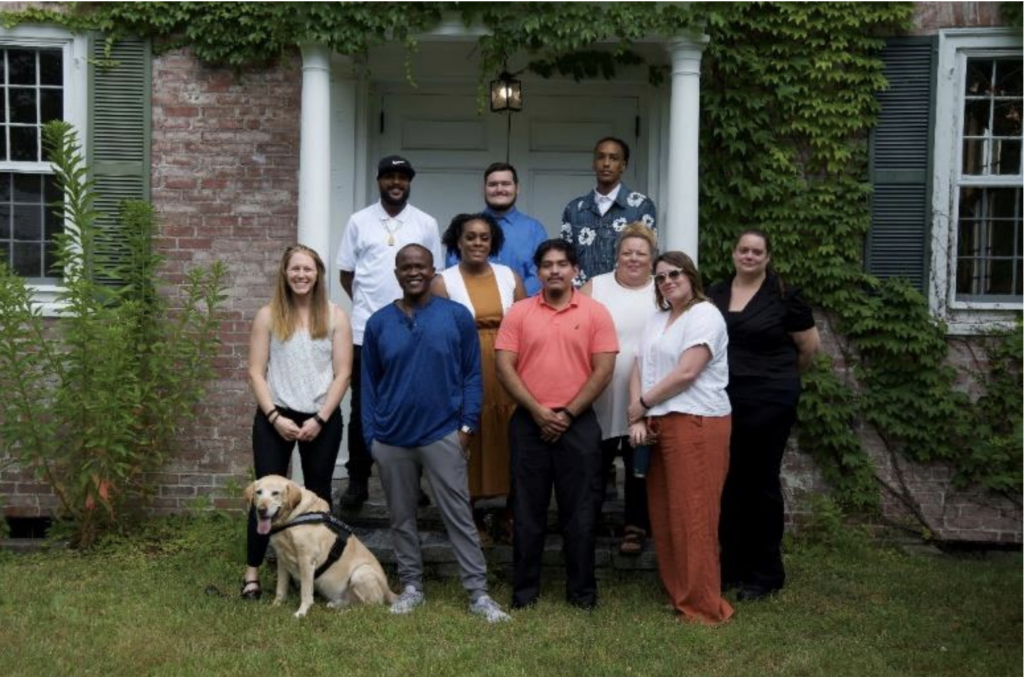Earl Miller, Director Of The CRESS Department, Reflects On The Program’s Impact Since Full Time Operations Started In January

Earl Miller, Director of CRESS. Photo: amherstma.gov
As the upcoming public listening session with the Community Responder for Equity, Safety and Service Department (CRESS), scheduled for Saturday, March 25, drew nearer, the Indy asked CRESS Director Earl Miller to share his reflections on the creation of the department in early 2022,, his role in it, and its role in the Amherst community.
The department provides the town with a team of trained civilian responders who provide community safety services in situations that don’t involve violence or serious crime. Hence, it offers a civilian, unarmed alternative to calls that might otherwise require a response from the Police Department. The goal of the department is to ensure that any public safety response is anti-racist, equitable, just, and fair. CRESS also offers preventative services that get at the root of assisting community members to avoid necessitating public safety involvement in the first place.
Miller explained that he was drawn to his role due to both his professional and personal background. Before coming to Amherst, he explained, he was a certified peer specialist, meaning he is someone who has received specialized professional training to work directly with patients to help them address substance abuse and mental health disorders. He has also worked to help provide housing and support to communities in poverty in Western Massachusetts for his entire adult life. Although he isn’t originally from Amherst, Miller said that it is “an easy town to like.”
When discussing his personal connection to his work, he explained that he has experienced the struggles that many of people who call in to CRESS’ are currently living through, such as homelessness, poverty, and mental health challenges.
“I’m really motivated by finding ways to make the world more tangibly accessible for folks. I think one of the things that people don’t think about when it comes to poverty is how hard it is when the folks around you also can’t support […] so finding ways to support people in ways that reflect the way that natural support might look like, that don’t cost people their kind of dignity — that’s my passion,” he explained.
Miller also explained that when he interviewed for his current role, he was also testing the waters to make sure the Amherst town government meant what they said.
“It was really me looking to see if these folks meant what they said. They asked me incredibly challenging questions, and pushed me on things, and it felt like this was a place that was really committed to the work.”
After he got the job, the brand new department progressed rapidly, Miller said. He started in March, 2022 as the only employee of the department. Between March and June he worked with other town staff to create job descriptions and consulted with unions as part of the process of approving the positions before creating a hiring committee. New CRESS employees were sworn in on July 5 and received nine weeks of training before the department began operating on September 6.

Reflecting on this process, Miller said, “I sometimes hear from other communities that they’re curious about how we managed to move so quickly, and the reality is that it never felt quick. It always just felt like one foot in front of the other. We set a goal. We accomplished it, we set another goal. We accomplished it. And now here we are.”
“What we do is really what I consider classical social work. We are not interested in making people do anything. We’re interested in supporting them to live the life that they most desire, to live in the healthiest and safest way possible.”
Speaking to the training of the CRESS responders, Miller explained that “[the] training was really intensive. It was a lot of class work, but also a lot of physical walking around town, getting accustomed to the space, meeting with different departments and community members to gain some understanding of what the work would look like, and then some. This can be intimidating work. What we do is really what I consider classical social work. We are not interested in making people do anything. We’re interested in supporting them to live the life that they most desire, to live in the healthiest and safest way possible.” As to the responders themselves, Miller praised their work, and the kind, humane ways they have handled all sorts of situations with Amherst community members.
Asked about what he has learned since operations began in September, Miller said that there have been both emotional and technical challenges. For example, he has observed a higher level of loneliness here than he had expected. “It is really hard when we go to see someone, and we do everything we can, and maybe we even solve the issue. But we might be that person’s only human contact, so even if we’re accomplishing the goal and getting them to where they need to be, knowing that we’re not going to be able to be there every day for a person [them]… is that loneliness is going to persist? It’s hard.”
On the technical side, Miller said that his job involves considerable paperwork and administrative tasks, and he often worries that every moment he spends on it is a moment when he isn’t out in the community helping directly.
Moving to his goals for the department, Miller explained that on the individual level, he hopes everyone that CRESS comes in contact with feels respected by the department. “I want the folks that we run into to feel seen, to feel like their concerns matter to us…like we empowered them, that we advocated ‘with’ them and not ‘for’ them, and that we taught them how to do things in a way to get their needs met.”
As for the department’s long-term goals, he hopes that CRESS will continue to function indefinitely, and that it will continue to grow and evolve under future leaders. He stressed that there is no road-map for how the department should act, and that both the responders are constantly learning how to address each unique challenge and handle every new interaction. Miller said that he often reminds the team that “we’re going to be better tomorrow, because we lived through today, and we learned, and we paid attention to what we did.”
Regarding the broader picture of public safety in Amherst, Miller said that CRESS was created in part to address concerns of town residents about policing, which, he added, originated from historical realities. He also emphasized the importance of addressing mental health in a comprehensive manner, and recognizing that people might need resources other than police officers for help. “Mental health issues are not some side thing that we cannot talk about anymore. Mental health calls are a large portion of the 911 calls in town and all around the country [and] it is not lost on me hat there have been at least three folks in the last year — maybe a little bit more — in the Commonwealth with mental health crises who were killed by police when they called for help. I think what we offer is a different way of approaching those situations [and it] warrants CRESS existing.”
“I think the most important part about CRESS is that I didn’t think this thing up. The town did, and I just got to test it out…. My advice to the community would be that they have shown an ability to be capable and fearless of taking on innovative challenges, and I would encourage folks to bring that same spirit of one collaboration and trust for each other to any issue that they they look at, and I have full faith that they’ll figure it out.”
When asked if he thinks more changes need to be made in regard to policing and public safety in Amherst, Miller explained that he believes the town’s ability to create and implement CRESS proves that they are able to address issues in a brave and innovative way. “I think the most important part about CRESS is that I didn’t think this thing up. The town did, and I just got to test it out…. My advice to the community would be that they have shown an ability to be capable and fearless of taking on innovative challenges, and I would encourage folks to bring that same spirit of one collaboration and trust for each other to any issue that they they look at, and I have full faith that they’ll figure it out.” Miller explained that although he and the Amherst police department sometimes overlap, he believes that they are all doing the best they can. “The town benefits from having more public safety professionals who care about the folks in our community, and I hope that it’s not a zero sum game of pitting us against each other.”
As the interview drew to a close, Miller emphasized one last point he hopes will help the Amherst community understand CRESS’s function here. “We don’t see people as problems to be solved. We see people as our neighbors, and that may sometimes mean we take longer to solve an issue. But you can’t think about people as just problems to be solved. There’s no good, — there’s no historical good — in that.”
A listening session on CRESS’s work is scheduled for 2 p.m. on Saturday, March 25, in the Town Room of the Town Hall. A remote option will also be available: https://amherstma.zoom.us/j/83394825481.
